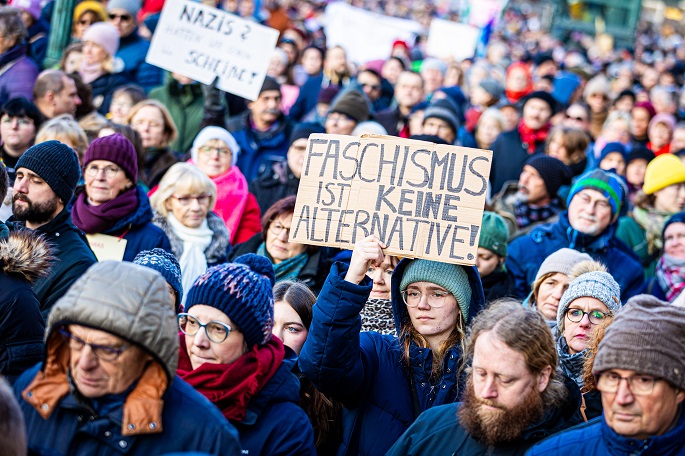Weekend of mass protests across Germany to decry far-right AfD
Published : 21 Jan 2024, 19:55
Huge crowds of protesters in Germany once again took to the streets on Sunday to rally against the right-wing Alternative for Germany (AfD) party and its anti-immigrant stance.
In Munich, a massive turnout of at least 80,000 people led organizers to call off the event due to overcrowding on Sunday afternoon, according to police. Organizers and police had expected around 25,000 people at the demonstration and were surprised by the sheer size of the crowd.
Many who turned up in Munich carried signs and banners comparing the AfD to the Nazis and rejecting their anti-immigrant rhetoric. Among the signs were the slogans "No tolerance for intolerance" and "AfD - a nightmare for Germany."
In Cologne, organizers estimated that 70,000 people joined the demonstration there against the AfD and the far right, including a number of well-known local musicians. Police in Cologne described the crowd estimate as realistic.
In the northern port city of Bremen, police estimated that between 35,000 and 40,000 people were marching at a rally against the far right that was backed by trade unions, political parties, local companies and the Bundesliga football club Werder Bremen.
Chants heard at the demonstration included "All of Bremen hates the AfD" and "All together against fascism."
Further protests are expected in several German cities, including Cottbus, Dresden and Chemnitz in the east.
In Berlin, a massive crowd appears likely, where an alliance of different organizations has called on people to gather in front of the Bundestag, or lower house of parliament, from 4 pm (1500 GMT).
While police are only expecting 1,000 participants, past demonstrations have far exceeded initial estimates and Berlin is home to a very active protest scene.
Germany has been swept by protests for over a week following the release of an investigative report which revealed that AfD members had attended a meeting of far-right extremists in November.
At the meeting in Potsdam outside Berlin, participants discussed plans to repatriate asylum seekers and migrants deemed not assimilated enough, even those with German passports.
The report by investigative outlet Correctiv published on January 10 has caused an uproar in Germany, where there is mounting dread among mainstream political parties about the surge in public support for the AfD.
The party is riding high in the polls of three former East German states that hold regional elections later this year.
At the Potsdam meeting, far-right extremists discussed topics like "remigration," a term frequently used in far-right circles as a euphemism for the expulsion of immigrants and minorities.
Anti-AfD demonstrations have already drawn huge numbers of people. At least 300,000 people joined protests on Saturday, according to counts by the police and organizers, with roughly 35,000 people attending rallies in Frankfurt and Hanover alone.
Vice Chancellor Robert Habeck has called the demonstrations as an encouraging sign for democracy.
"Democracy lives from the people who stand up for it," Habeck told the Augsburger Allgemeine newspaper.
Katrin Göring-Eckardt, a senior Green Party lawmaker from the eastern state of Thuringia, wrote on X (formerly Twitter) on Saturday night that she was particularly pleased with the crowds in parts of the former East Germany, such as Leipzig, Erfurt and Dresden.
"Everywhere in the East, people are on the streets for the democracy we fought for in 1989," she wrote. "Encouraging!"
Foreign Minister Annalena Baerbock, speaking at a conference of her Green Party on Sunday, said "we must stand up for democracy with all our strength."
She praised the growing protest against the far-right, especially in Germany's smaller and medium-sized cities. "That is the strength of our country."


